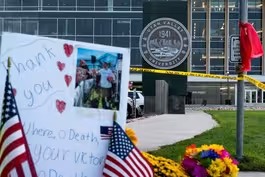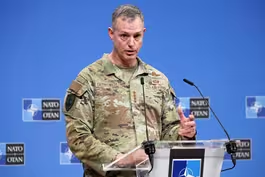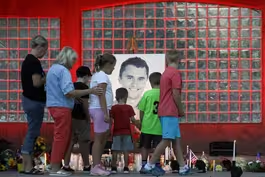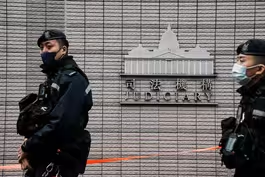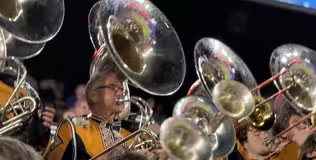
Brooks and Capehart on America’s reactions to Kirk’s killing
Clip: 9/12/2025 | 10m 46sVideo has Closed Captions
Brooks and Capehart on Americans’ reactions to the killing of Charlie Kirk
New York Times columnist David Brooks and Jonathan Capehart of MSNBC join Amna Nawaz to discuss the week in politics, including the fatal shooting of Charlie Kirk and the tough questions it raises about the political environment in the country.
Problems playing video? | Closed Captioning Feedback
Problems playing video? | Closed Captioning Feedback
Major corporate funding for the PBS News Hour is provided by BDO, BNSF, Consumer Cellular, American Cruise Lines, and Raymond James. Funding for the PBS NewsHour Weekend is provided by...

Brooks and Capehart on America’s reactions to Kirk’s killing
Clip: 9/12/2025 | 10m 46sVideo has Closed Captions
New York Times columnist David Brooks and Jonathan Capehart of MSNBC join Amna Nawaz to discuss the week in politics, including the fatal shooting of Charlie Kirk and the tough questions it raises about the political environment in the country.
Problems playing video? | Closed Captioning Feedback
How to Watch PBS News Hour
PBS News Hour is available to stream on pbs.org and the free PBS App, available on iPhone, Apple TV, Android TV, Android smartphones, Amazon Fire TV, Amazon Fire Tablet, Roku, Samsung Smart TV, and Vizio.
Providing Support for PBS.org
Learn Moreabout PBS online sponsorshipAMNA NAWAZ: People are still grappling with the fatal shooting of Charlie Kirk, which raised tough questions about the political environment in this country.
For that and more, we turn now to the analysis of Brooks and Capehart.
That is New York Times columnist David Brooks and Jonathan Capehart of MSNBC.
Great to see you both.
JONATHAN CAPEHART: Hi, Amna.
AMNA NAWAZ: So let's just start with the fact that Charlie Kirk was an undeniable political force, right, had incredible influence over a new generation of young conservative men in particular.
His death, you have probably both seen, I mean, former presidents have weighed in.
It is being reported on overseas.
I was watching BBC today.
It was wall to wall about coverage of his killing and the arrest of the alleged gunman here.
There's a sense, David, that this marks something different and notable in our nation.
Do you believe that?
DAVID BROOKS: Yes, I do.
Another step.
In the hours after Kirk was killed, I started getting e-mails and texts from my friends who were supporters of the president.
And a couple of them said independently, this is our George Floyd.
And they didn't mean that literally, but in terms of emotional reaction into how gutted they were.
And they just felt that just something really terrible has happened.
Another e-mailed me that this is -- there's no coming back from this.
And I think what they meant by that, and I had a later conversation, they see in their own lives, as I think we all do, 23-year-old young men who have turned nihilist, who just don't -- they're lonely.
Their whole life is on Discord or whatever.
And they have turned not -- to believe in nothing, nothing to lose, hatred.
I would recommend a book to capture the moment.
It just came out a week ago, and obviously it was written before the killing by a guy name Bill Galston, who's probably been on the show multiple times, works at the Brookings Institution.
And it came out just a week ago, it's called "Anger, Fear and Hatred" -- or and "Domination," "Anger, Fear and Domination."
And it's about the dark passions.
We all need to be motivated by something.
And good leaders were motivated by what you might call the bright passions, hope, aspiration, a vision of a better life.
But people have discovered that it's more powerful to motivate people with the dark passions, like anger, hatred, resentment and the urge to dominate.
And this has been true of politicians in both parties.
I had a very poignant conversation a decade ago now with a Democratic ad maker who said, I want to elect Democrats, but every ad I make is about anger and fear and hatred.
And so I feel like I'm part of the problem.
And the thing about the dark passions, they're imperialistic.
They're like cancer.
Once they get in you and in the body politic, they tend to spread.
And it's super hard to turn that around.
AMNA NAWAZ: Jonathan.
JONATHAN CAPEHART: This has been a tough week.
AMNA NAWAZ: Yes.
JONATHAN CAPEHART: The killing of someone that prominent should shock the senses of everyone.
I think Governor Cox of Utah has been superb in speaking to our better angels, in trying to lower the temperature of the rhetoric, of trying to remind us of who we are as a nation and who we are as a people, and trying to get us back to being able to disagree without being -- not only without being disagreeable, but without being murderous.
But I don't know if this is going to be the inflection point that a lot of people wonder that it will be, because it was so -- it's so heinous.
The video that a lot of people got to see, whether they wanted to or not, makes this unlike anything we have we have seen in a long time.
But I remember being on set of an MSNBC show in December of 2012, what I'm thinking of, of Sandy Hook, and what was so jarring about Sandy Hook was that we saw a story of not just a school shooting, but a school shooting in an elementary school with little -- with young children.
We all thought as a nation that this is the moment that something will happen on this particular issue on gun violence, and yet nothing happened.
Nothing's changed.
And here we are yet again in a situation where we're talking about an incident of gun violence.
But because of who the victim was, just in terms of our politics, but also who he was in terms of the president and this administration, this is one thing that I have to factor in to my thinking about all this when I look at the reaction from the president and his administration, that this just this wasn't just the murder of someone who was a like-minded person.
This was family to them.
And I try to keep that in mind as I watch the reaction.
But I have to tell you, I am very concerned about what that reaction is going to be in the days and weeks and months ahead.
AMNA NAWAZ: Well, let's talk about that for just a second, the -- in terms of the reaction from the president, David, you have seen the president first say that his supporter should respond with nonviolence.
He said that's what Charlie would have wanted.
The next moment, he's blaming the radical left political violence.
There's people around him now even suggesting that they should be deporting people who are critical of Charlie Kirk after his killing.
But in the context of the country they're speaking to, just take a look at this poll we pulled up from April of 2025.
PRRI asked people if true American patriots may have to resort to violence in order to save our country.
Basically, what's your view of political violence?
Eighty-one percent, the overwhelming majority of Americans, 81 percent, said, no, they disagreed with that sentiment.
Slightly more Republicans, 18 percent, would agree with it, than Democrats at 11 percent.
But that is the environment we're in right now.
What does that say to you about whether or not we will see more political violence ahead?
DAVID BROOKS: Yes, it only takes a few, right?
It only takes a few young men like the -- the young man who tried to kill Trump, the young - - person who killed the Minnesota speaker, and then the guy who killed Charlie Kirk.
But the reaction -- I have to say, I have been appalled by some of the reactions, a few, including the president's.
But I have to say I have been sort of impressed.
On the whole, I think a lot of people in various political stripes who really disagreed with Charlie Kirk have been pretty noble about this, about seeing past politics, into a human life, into a Christian, into a family man, like just seeing this is a boat we're all in.
And I have seen that across the political divide.
And when I have looked at the Republican reaction, the overwhelming majority has been, he was talking to people.
He was talking to people he disagreed with.
And that's instructive to us.
There's a moment -- Thomas Hobbes, philosopher, said fear can sometimes be used for good.
When you become so afraid that your society is slipping into chaos, then you you're jolted out of your bad habits.
And maybe this will be a moment for this.
It really takes an act of heroism.
To get out of the dark passion doom loop, there has to be a moment of interruption, where you say, no, I'm stopping this.
I'm not partaking.
I will respond to hatred with love.
And, of course, the ultimate example of this is the civil rights movement, where they -- Martin Luther King preached a gospel of love, and in an aggressive way that was going to force the sins of society into the faces of people and make them see, is this who we are?
And so I don't know if this will be a turning point where people will make that interruption and halt the cycle, but so far I felt it was a -- it's been a moment, with a few exceptions, of coming together.
JONATHAN CAPEHART: Can I just say that, in your example, David, with the civil rights movement and Dr. King and all those marchers, they had an ally in the president who was there to break the passions and to -- and to lead.
And here, when it comes to what you were just saying, I am not convinced that our current president is the one who's going to be able to do that.
And even though we don't have kings in this country, we have always looked at our -- looked to our presidents as moral exemplars, especially in moments like these, in moments of national trauma.
And, right now, I'm not sure President Trump is capable or willing to show that kind of leadership.
DAVID BROOKS: Fair point.
AMNA NAWAZ: In a minute or so we have left, then, Jonathan, I will just follow up.
If not from the president himself, because we have seen mixed messages even in this last two days or so, where does the message have to come from?
What has to happen to reach this inflection point you have both noted is necessary in this country?
JONATHAN CAPEHART: We need more Governor Coxes.
We need more people like him in high positions, especially in high positions of leadership, executive leadership, who step out and do what Governor Cox has done.
If we haven't seen it fully and consistently from the president, then we need to see it from governors, we need to see it from mayors, we need to see it from members of Congress, we need to see it from the speaker, the majority leader of the Senate.
We need to see it from and hear it from leaders up and down the chain on both sides of the aisle just to finally say, OK, look, we can't keep going down this road, because, if we do, the slide that a lot of people feel that we're on will be inexorable.
And I'm not -- I -- as fearful as I am, I am praying, praying that leaders will lead.
AMNA NAWAZ: Here's to that prayer and hopefully better days ahead.
Jonathan Capehart, David Brooks, thank you so much.
JONATHAN CAPEHART: Thanks, Amna.
Authorities detail arrest of suspect in Kirk’s killing
Video has Closed Captions
Clip: 9/12/2025 | 5m 13s | Authorities detail investigation and arrest of suspect in Charlie Kirk’s killing (5m 13s)
How NATO is responding to Russia’s drone incursion
Video has Closed Captions
Clip: 9/12/2025 | 5m 34s | NATO responds to Russia’s drone incursion with ‘Eastern Sentry’ defense plan (5m 34s)
How to talk with kids about violent images of Kirk’s killing
Video has Closed Captions
Clip: 9/12/2025 | 9m 36s | How to talk with kids about violent images of Charlie Kirk’s killing (9m 36s)
Jimmy Lai’s son discusses Beijing’s crackdown on speech
Video has Closed Captions
Clip: 9/12/2025 | 7m 2s | Son of detained Hong Kong journalist Jimmy Lai on Beijing’s crackdown on speech (7m 2s)
Retiree realizes lifelong dream of joining LSU marching band
Video has Closed Captions
Clip: 9/12/2025 | 6m 50s | Retired accountant realizes lifelong dream of joining LSU’s marching band (6m 50s)
Providing Support for PBS.org
Learn Moreabout PBS online sponsorship
- News and Public Affairs

FRONTLINE is investigative journalism that questions, explains and changes our world.

- News and Public Affairs

Amanpour and Company features conversations with leaders and decision makers.












Support for PBS provided by:
Major corporate funding for the PBS News Hour is provided by BDO, BNSF, Consumer Cellular, American Cruise Lines, and Raymond James. Funding for the PBS NewsHour Weekend is provided by...

